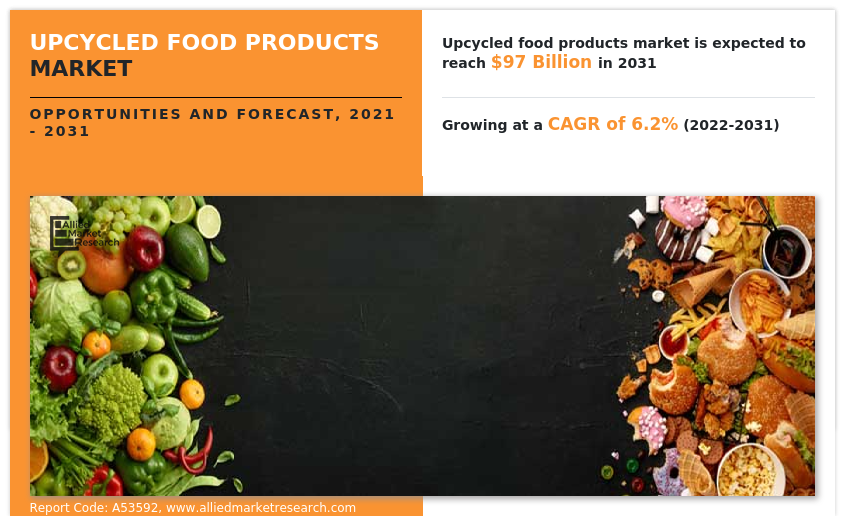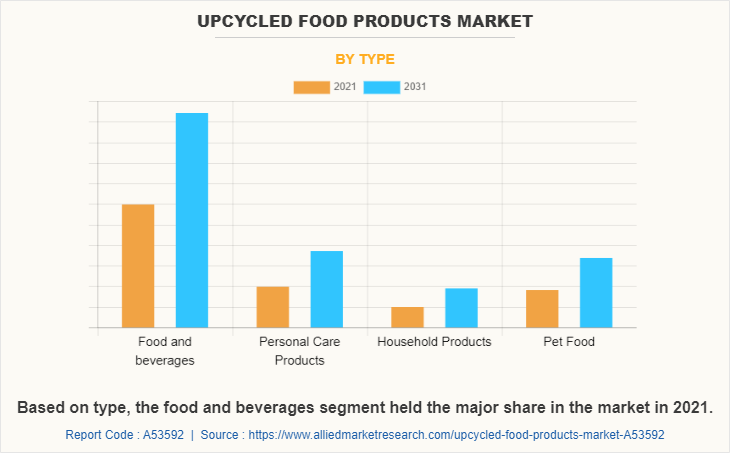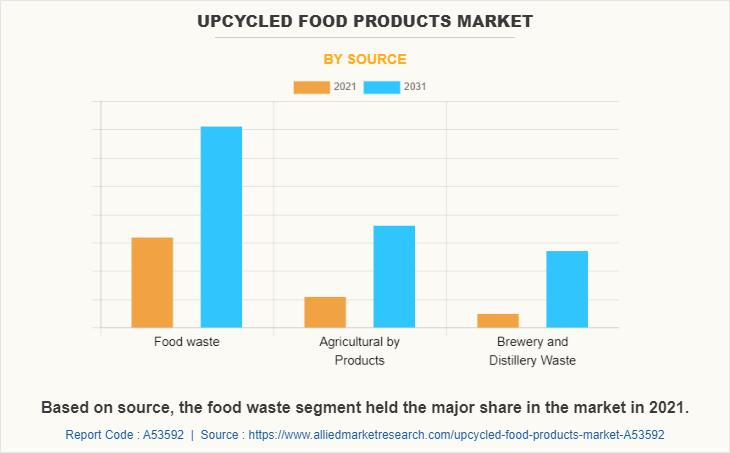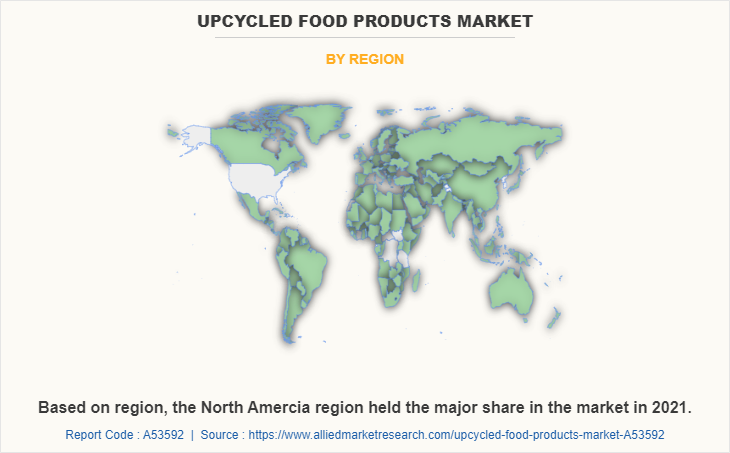The global upcycled food products market size was valued at $53.7 billion in 2021, and is projected to reach $97 billion by 2031, growing at a CAGR of 6.2% from 2022 to 2031.
The upcycled food products industry can be defined as a segment of the food industry that involves transforming food byproducts, surplus or otherwise wasted ingredients, or other edible food materials that would typically be discarded into new food products that are safe, nutritious, and appealing to consumers. Upcycled food products are created using sustainable and ethical methods that reduce food waste and promote the circular economy. The market includes a wide range of products, such as snacks, bakery products, beverages, condiments, and pet food, among others.

The upcycled food products market size is projected to be fueled by the rising cost of raw materials. The market for upcycled food products is being driven by the rising cost of raw materials, which is forcing businesses to look out alternate, more affordable sources of food ingredients. Businesses can cut expenses by reusing excess or waste materials that would otherwise go to waste by upcycling food waste. This helps businesses increase their bottom line and lower their overall cost of production, while also lessening their environmental effect and promoting a more sustainable food system.
Additionally, as businesses search for new and more effective ways to upcycle food waste and transform it into valuable products, the rising cost of raw materials is spurring innovation in the upcycling sector.
Moreover, increased government initiatives and expenditures in the development of food collecting waste, separation, and upcycling technology in both established and key new countries have led to an increase in small and medium-sized food waste upcycling firms. Construction of a food waste management facility in these places is anticipated to reduce product dumping in landfills and increase upcycling.
For instance, Nescafe Nativ Cascara, a carbonated soft drink derived from organic cascara, the fruit known as the "coffee berry" that surrounds the coffee bean, was just recently launched in Australia. By turning this coffee berry, which is high in antioxidants, into a fashionable beverage, an agricultural leftover that would typically be thrown away finds a new use. In addition, ReGrained LLC published the first upcycled puffs on the internet. The puffs are powered by the company's signature upcycled product, SuperGrain+, which is created utilizing their specialized technique to transform wasted brewers' grain into a healthy, versatile, and beneficial ingredient.
The global market is propelled by the growing demand for sustainable and eco-friendly products. Growing demand for eco-friendly and sustainable products is expanding the upcycled food products market. As consumers become more aware of the impact food waste has on the environment, they are increasingly looking for products that support sustainability and waste reduction. As a result, demand for products made from upcycled foods is increasing. Consumers are increasingly aware of the ethical and social implications of their purchasing patterns and are seeking products that are ethical and environmentally friendly. As a result, demand for food made from surplus or waste is increasing. Businesses recognize the benefits of providing sustainable and environmentally friendly products and want to increase brand awareness in this way. This is driving the development and expansion of the upcycled food products market.
Moreover, the market for upcycled food products industry is experiencing enormous growth potential as a result of the increased popularity of vegan and plant-based diets. The demand for plant-based ingredients, such as upcycled food products derived from leftover food and other sustainable sources, is rising as more people adopt plant-based diets. Companies are developing new upcycled food products that serve to these dietary preferences and satisfy customer demands for sustainability and eco-friendliness in response to the rising demand for plant-based and vegan diets. Consumers are looking for more sustainable and eco-friendly food options, including upcycled food products, as they become more conscious of the environmental and health benefits of vegan and plant-based diets.
Additionally, damage due to poor storage and handling during transportation is further boosting the market growth. Fresh product handling damage is inevitable. As a result, this produce can be used to create products from food waste. Some fruits and vegetables, like berries, have very short shelf lives but produce seed oil, a commodity with a high return on investment, from food waste. Fresh produce's short shelf life also contributes to food waste, opening up upcycled food products market demand.
However, one of the main problems limiting the growth of the market for upcycled food products is competition from traditional food goods. Due to their familiar taste, texture, and quality, conventional food products are readily available, well-established in the market, and frequently preferred by consumers. Upcycled food products find it challenging to compete with traditional food products in terms of consumer preferences and market share as a result. The lower price of traditional food products compared to upcycled food goods is another aspect of the competition from conventional foods. Consumers find conventional food ingredients to be more appealing since they are frequently more affordable and accessible than upcycled food products. In terms of brand identification and consumer awareness, conventional food goods also enjoy a major marketing and promotion edge over upcycled food products. Due to this, it is challenging for upcycled food products to compete with traditional food products in terms of brand recognition and market share.
The upcycled food products market forecast is segmented on the basis of type, source, distribution channel, and region. Based on type, the market is classified into food and beverages processing, personal care products, Household products, and pet food. Further, food and beverages processing segment is classified into bakery and snacks, drinking beverages, dairy products. Based on source, the market is classified into food waste, agricultural by products, and brewery and distillery waste. Based on distribution channel, the market is classified into online and offline. Region wise, it is analyzed across North America (U.S., Canada, Mexico), Europe UK, Germany, France, Netherlands, Italy, Spain, Russia, and Rest of Europe), Asia-Pacific (China, Japan, India, Australia, New Zealand, South Korea, Philippines, and Rest of Asia-Pacific), and LAMEA (Brazil, Argentina, UK, South Africa, and Rest of LAMEA).

Based on type, the market is classified into food and beverages processing, personal care products, Household products, and pet food. The food and beverages processing segment accounted for a major share in the upcycled food products market in 2021 and is expected to grow at a significant CAGR during the forecast period. Demand for upcycled foods in food and beverages is increasing due to growing consumer awareness and concerns about food waste. Consumers are increasingly aware of the environmental and health benefits of upcycled foods, which is driving demand for these products. Food waste is a growing concern, and upcycled foods are recognized as a way to reduce food waste and use food resources more efficiently. Hence, these factors are fueling the growth of the food & beverage segment in the upcycled food products market.
Further, food and beverages processing segment is classified into bakery and snacks, drinking beverages, dairy products. The bakery and snacks segment accounted for a major share in the upcycled food products market in 2021 and is expected to grow at a significant CAGR during the forecast period. Growing demand for healthy and convenient snacks in the market is driving the demand for upcycled snacks. In addition, the demand for a variety of upcycled snacks and foods has increased over the past few years, which is also beneficial to consumers. Therefore, these factors have increased the demand for different types of upcycled bakery products while opening up opportunities for the global upcycled food products market growth.

Based on source, the market is classified into food waste, agricultural by products, and brewery and distillery waste. The food waste segment accounted for a major upcycled food products market share in 2021 and is expected to grow at a significant CAGR during the forecast period. As businesses can decrease food waste and generate new revenue streams from products that would otherwise be wasted, the market for upcycled food products is seeing an increase in demand for the food waste segment. A more sustainable alternative to conventional food systems is offered by upcycling, which also aids in the shift to a circular economy. It is possible to repurpose waste materials produced during food processing or manufacturing to create new goods.

Based on distribution channel, the market is classified into online and offline. The offline segment accounted for a major upcycled food products market share in 2021 and is expected to grow at a significant CAGR during the forecast period. For a variety of reasons, offline retailers are expanding in the market for upcycled food goods. Offline stores give clients the chance to feel and touch things before making a purchase and to receive individualized advice from sales staff, whereas internet retailers only offer convenience and accessibility. Many shoppers still favour going to stores in person, particularly when purchasing food products where they can see, smell, and even taste the products before making a purchase.

Region wise, it is analyzed across North America, Europe, Asia-Pacific, and LAMEA. The North America upcycled food products market is accounted for a major share in 2021 and is expected to grow at a significant CAGR during the forecast period. The demand for upcycled food products in North America is rising as the rise of e-commerce and online grocery shopping, which has made it easier for consumers to access a wider range of upcycled food products.
The major players operating in the market focus on key market strategies, such as mergers, product launches, acquisitions, collaborations, and partnerships. They have been also focusing on strengthening their market reach to maintain their goodwill in the ever-competitive market. Some of the key players in the upcycled food products market include Rebon, Abokichi, Diana's, Blue Circle Foods, Riff, US Foods, The Spare Food Co., ReGrained, Blue Stripes Urban Cacao, GoodSport Nutrition, Agricycle Global, SUPERFRAU, Lost & Found Distillery, and Leashless Lab.
Key Benefits For Stakeholders
- This report provides a quantitative analysis of the market segments, current trends, estimations, and dynamics of the upcycled food products market analysis from 2021 to 2031 to identify the prevailing upcycled food products market opportunities.
- The market research is offered along with information related to key drivers, restraints, and opportunities.
- Porter's five forces analysis highlights the potency of buyers and suppliers to enable stakeholders make profit-oriented business decisions and strengthen their supplier-buyer network.
- In-depth analysis of the upcycled food products market segmentation assists to determine the prevailing market opportunities.
- Major countries in each region are mapped according to their revenue contribution to the global market.
- Market player positioning facilitates benchmarking and provides a clear understanding of the present position of the market players.
- The report includes the analysis of the regional as well as global upcycled food products market trends, key players, market segments, application areas, and market growth strategies.
Upcycled food products Market Report Highlights
| Aspects | Details |
| Market Size By 2031 | USD 97 billion |
| Growth Rate | CAGR of 6.2% |
| Forecast period | 2021 - 2031 |
| Report Pages | 360 |
| By Type |
|
| By Source |
|
| By Distribution Channel |
|
| By Region |
|
| Key Market Players | Diana's Bananas, LLC., Lost & Found Distillery, Inc., Abokichi, Outcast Foods, Blue Stripes LLC., Superfrau, The Spare Food Co., Alice & Ambre Inc., Riff Cold Brewed, ReGrained |
Analyst Review
According to the insights of the CXOs, the global upcycled food products market is expected to witness robust growth during the forecast period. This is attributed to the growing demand for sustainable and eco-friendly products. Growing demand for eco-friendly and sustainable products is expanding the upcycled food products market. As consumers become more aware of the impact food waste has on the environment, they are increasingly looking for products that support sustainability and waste reduction. As a result, demand for products made from upcycled foods is increasing. Furthermore, to attract consumers around the globe, key players in the market are investing in R&D activities and advertising & promotion of products.
CXOs further added about rising demand for plant-based and vegan diets is further creating opportunities in the upcycled food products market. The market for upcycled food products is experiencing enormous growth potential as a result of the increased popularity of vegan and plant-based diets. The demand for plant-based ingredients, such as upcycled food products derived from leftover food and other sustainable sources, is rising as more people adopt plant-based diets. Companies are developing new upcycled food products that serve to these dietary preferences and satisfy customer demands for sustainability and eco-friendliness in response to the rising demand for plant-based and vegan diets. However, perception issues regarding upcycled food products among consumers is a major restraint which is hampering the upcycled food Products market Growth
The global upcycled food products market size was valued at $53.7 billion in 2021, and is projected to reach $97 billion by 2031
The global Upcycled food products market is projected to grow at a compound annual growth rate of 6.2% from 2022 to 2031 $97 billion by 2031
Some of the key players in the upcycled food products market include Rebon, Abokichi, Diana's, Blue Circle Foods, Riff, US Foods, The Spare Food Co., ReGrained, Blue Stripes Urban Cacao, GoodSport Nutrition, Agricycle Global, SUPERFRAU, Lost & Found Distillery, and Leashless Lab.
The North America upcycled food products market is accounted for a major share in 2021
Surge in demand for sustainable and eco-friendly products
Loading Table Of Content...



